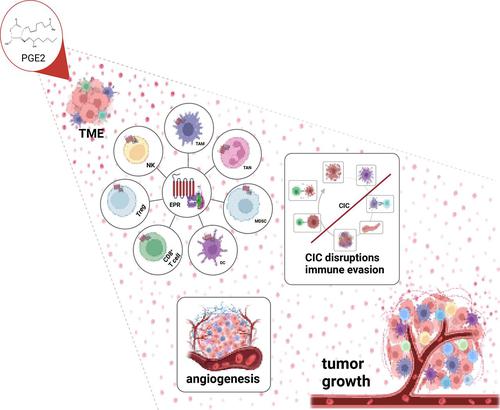当前位置:
X-MOL 学术
›
Pharmacol. Rev.
›
论文详情
Our official English website, www.x-mol.net, welcomes your feedback! (Note: you will need to create a separate account there.)
Prostaglandin E2 in the Tumor Microenvironment, a Convoluted Affair Mediated by EP Receptors 2 and 4
Pharmacological Reviews ( IF 21.1 ) Pub Date : 2024-05-01 , DOI: 10.1124/pharmrev.123.000901 Ana Santiso , Akos Heinemann , Julia Kargl
Pharmacological Reviews ( IF 21.1 ) Pub Date : 2024-05-01 , DOI: 10.1124/pharmrev.123.000901 Ana Santiso , Akos Heinemann , Julia Kargl

|
The involvement of the prostaglandin E2 (PGE2) system in cancer progression has long been recognized. PGE2 functions as an autocrine and paracrine signaling molecule with pleiotropic effects in the human body. High levels of intratumoral PGE2 and overexpression of the key metabolic enzymes of PGE2 have been observed and suggested to contribute to tumor progression. This has been claimed for different types of solid tumors, including, but not limited to, lung, breast, and colon cancer. PGE2 has direct effects on tumor cells and angiogenesis that are known to promote tumor development. However, one of the main mechanisms behind PGE2 driving cancerogenesis is currently thought to be anchored in suppressed antitumor immunity, thus providing possible therapeutic targets to be used in cancer immunotherapies. EP2 and EP4, two receptors for PGE2, are emerging as being the most relevant for this purpose. This review aims to summarize the known roles of PGE2 in the immune system and its functions within the tumor microenvironment.
中文翻译:

肿瘤微环境中的前列腺素 E2,EP 受体 2 和 4 介导的复杂事件
人们早已认识到前列腺素 E2 (PGE2) 系统参与癌症进展。 PGE2 作为一种自分泌和旁分泌信号分子,在人体内具有多效性。已观察到肿瘤内高水平的 PGE2 和 PGE2 关键代谢酶的过度表达,并表明这些酶有助于肿瘤进展。这已被声称适用于不同类型的实体瘤,包括但不限于肺癌、乳腺癌和结肠癌。 PGE2 对肿瘤细胞和血管生成有直接影响,已知可促进肿瘤发展。然而,目前认为 PGE2 驱动癌症发生的主要机制之一是抑制抗肿瘤免疫,从而为癌症免疫疗法提供了可能的治疗靶点。 EP2 和 EP4 是 PGE2 的两种受体,正在成为与此目的最相关的受体。本综述旨在总结 PGE2 在免疫系统中的已知作用及其在肿瘤微环境中的功能。
更新日期:2024-05-03
中文翻译:

肿瘤微环境中的前列腺素 E2,EP 受体 2 和 4 介导的复杂事件
人们早已认识到前列腺素 E2 (PGE2) 系统参与癌症进展。 PGE2 作为一种自分泌和旁分泌信号分子,在人体内具有多效性。已观察到肿瘤内高水平的 PGE2 和 PGE2 关键代谢酶的过度表达,并表明这些酶有助于肿瘤进展。这已被声称适用于不同类型的实体瘤,包括但不限于肺癌、乳腺癌和结肠癌。 PGE2 对肿瘤细胞和血管生成有直接影响,已知可促进肿瘤发展。然而,目前认为 PGE2 驱动癌症发生的主要机制之一是抑制抗肿瘤免疫,从而为癌症免疫疗法提供了可能的治疗靶点。 EP2 和 EP4 是 PGE2 的两种受体,正在成为与此目的最相关的受体。本综述旨在总结 PGE2 在免疫系统中的已知作用及其在肿瘤微环境中的功能。































 京公网安备 11010802027423号
京公网安备 11010802027423号